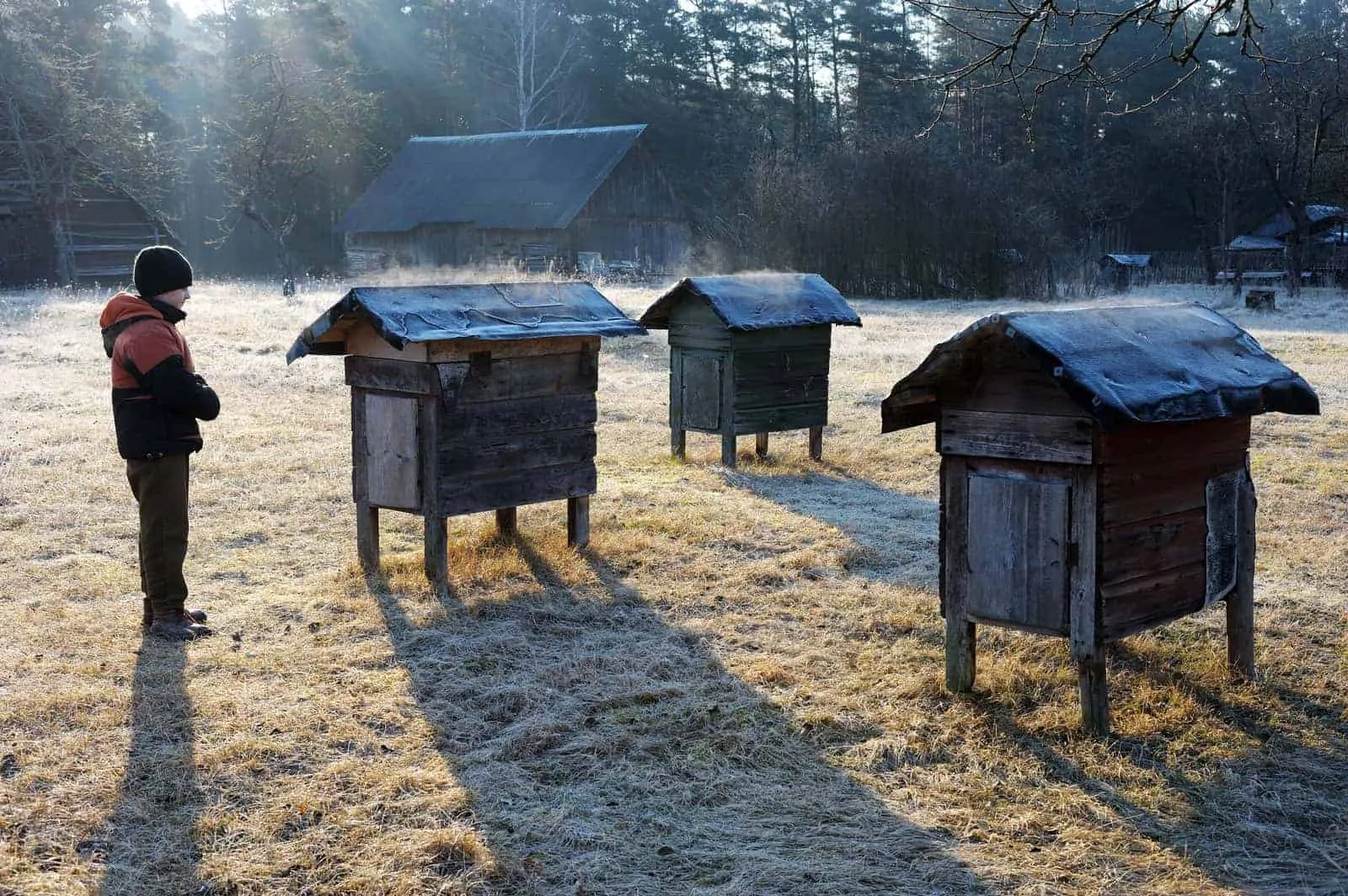Bees and kids are often not a happy combination. Taught to fear bee stings at a young age, children often erupt with screams and tears when a buzzing bee invades their space.
And though bees rarely sting without provocation, wriggling children (and dripping popsicles) can sometimes create the perfect storm of curiosity and disruption that results in a big, unhappy welt on a toddler’s knee.
With all this potential for screaming children and unhappy bees, it’s no wonder that budding parental beekeepers are hesitant to introduce bees to kids. Store-bought honey and safely swimming goldfish seem safer than a buzzing beehive.
But while family beekeeping may bring a few risks, consider the rewards: life lessons that make beekeeping with children a memorable (and educational!) experience for the whole family. And if you warm to the idea, look below for some awesome bee facts for kids, to grab their attention!
Learning about the Earth
Beekeeping is a wonderful way to teach your children about our planet. Your kiddo will be at the top of science class as they explain how flowers grow and multiply, how ecosystems work together, and why chemicals can be bad for plants. Even scientific concepts, like stimulus and response, can be taught through the lens of a beehive.
What happens to the taste of honey when lilacs are introduced to the family garden?
How do bees respond when the beehive starts to get crowded?
Watching science in action may spur a lifetime love of the natural world; at the very least, it will be science class in action.
Shared Goals, Shared Joy
One of the best ways to connect with loved ones is over a common interest. Whether it’s excitement over the latest Star Wars movie, cooking a special meal, or caring for a beehive: cultivating these common interests with your children will pay dividends for your shared future. While your little ones may not be able to help you lift heavy hives (consider a Top Bar hive, perhaps – and don’t forget how awesome that window will be to kids), there are plenty of beekeeping activities that they can help with.
- Let them record their observations in a special notebook
- Have them hold and label jars as you extract honey
- Ask for their opinion when bees are acting strangely
- Explain why the queen bee is so important to the hive
- Take them along to pick out pesticide-free plants
Involving children in the joys of beekeeping will help your child feel that distinct beekeeper’s pride as the family hives grow and reproduce.
Constant connectivity is a reality of today’s society: a society that can measure self-worth with Facebook likes and artistic talent by Instagram posts. Today’s children will inevitably spend more time online than previous generations, so cultivating a love for the natural world is an important, and challenging, aspect of parenting.
Watching bees (even from afar), planting bee-friendly flowers, and enjoying honey from a home backyard can do wonders for children glued to their favorite devices.
DIY Skills
In a society tied to quick convenience, there’s value in teaching children how to do things themselves. Drive-through food windows, fast fashion, and Amazon One-Click make it easier than ever to obtain anything we want at the click of a button. Now, more than ever, it’s important to empower our future adults with a few hands-on skills and some joy in doing things the slow way.
Beekeeping is the ultimate long-game joy. Consider honey: a common household ingredient most families easily and cheaply purchase in any grocery store. As a family of beekeepers, you’ll show your children how time and hands-on effort can produce an even better product than the ones in brightly-colored packages in the grocery aisle.
Honey is just the beginning of bee-related DIY family projects. Hand-planted flowers, homemade bee baths, hand-built hives, and DIY bee remedies will empower your children’s DIY skills.
Awesome Bee Facts for Kids!
The benefits are clearly there: so how can you engage your children in the joys of beekeeping?
Here are a few fun facts about bees for kids, to share with your little ones, each with a family-friendly beekeeping activity to inspire bee love.
Fact: Bees are so important to our Earth. They help grow delicious fruits and vegetables that we enjoy, like apples, peaches, and even some chocolate!
DO: Ask your children about his or her favorite food. Then, go through each ingredient and learn about where it comes from and the role bees play.
Fact: Bees can really boogie. In order to tell their friends where the tastiest pollen is, bees dance for each other! They use their dance moves to tell a story.
DO: Demonstrate your best dance move for your children, and ask them to tell you what story it could tell. Extra points for learning a new dance together!
Fact: Disappearing bees are a true mystery. Get out the magnifying glass and look for clues: bees have been disappearing from their hives for about fifteen years. Scientists have ideas about why this might be happening, but nobody knows for sure.
DO: Have your children think about why bees may choose to leave their home. What reasons can you come up with together?
Fact: Each bee has a special job. There’s the Queen, who lays eggs of future baby bees, the drones, who mate with queen, and the workers, who fly and bring home the best pollen to make honey (and, actually, a LOT more!). Each job is important, and helps the hive in a unique way!
DO: Encourage your child think about each family member (mom, dad, brothers, sisters). How does each family member help the rest of the family? What special jobs does your child have? What’s one job they’d like to learn? And how do their busy days compare to that of the ever-productive worker bee?
Fact: Bees make a whole lot of honey! Each hive box can produce sixty pounds (27 kg) or more of tasty, sweet honey.
DO: Ask your child what their favorite sweet treat is, or help them look up a new recipe with honey as a main ingredient. Let your child measure ingredients and mix up the bowl of ingredients, and savor the tasty treat together.
Fact: Bees are often drawn to the most beautiful and colorful of flowers. Often, it’s these colorful flowers that have the tastiest pollen!
DO: Print out a black-and-white flower, and encourage your child to decorate it with color and creativity! Consider laminating it, and hanging it over your garden.
With a little learning and a lot of care, beekeeping can be an activity for the whole family!
And finally, if you think your kids could indeed build a true interest and passion for beekeeping, how would you go about getting them actively involved? Watch this space… (more on that coming very soon)!

